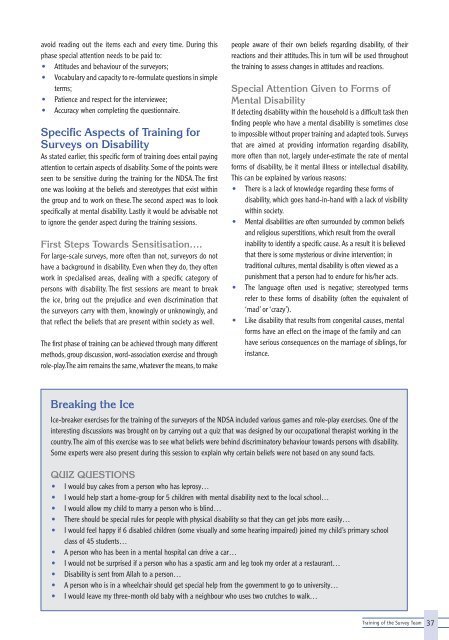Conducting Surveys on Disability: A Comprehensive Toolkit
Conducting Surveys on Disability: A Comprehensive Toolkit
Conducting Surveys on Disability: A Comprehensive Toolkit
You also want an ePaper? Increase the reach of your titles
YUMPU automatically turns print PDFs into web optimized ePapers that Google loves.
avoid reading out the items each and every time. During this<br />
phase special attenti<strong>on</strong> needs to be paid to:<br />
• Attitudes and behaviour of the surveyors;<br />
• Vocabulary and capacity to re-formulate questi<strong>on</strong>s in simple<br />
terms;<br />
• Patience and respect for the interviewee;<br />
• Accuracy when completing the questi<strong>on</strong>naire.<br />
Specific Aspects of Training for<br />
<str<strong>on</strong>g>Surveys</str<strong>on</strong>g> <strong>on</strong> <strong>Disability</strong><br />
As stated earlier, this specific form of training does entail paying<br />
attenti<strong>on</strong> to certain aspects of disability. Some of the points were<br />
seen to be sensitive during the training for the NDSA. The first<br />
<strong>on</strong>e was looking at the beliefs and stereotypes that exist within<br />
the group and to work <strong>on</strong> these. The sec<strong>on</strong>d aspect was to look<br />
specifically at mental disability. Lastly it would be advisable not<br />
to ignore the gender aspect during the training sessi<strong>on</strong>s.<br />
First Steps Towards Sensitisati<strong>on</strong>….<br />
For large-scale surveys, more often than not, surveyors do not<br />
have a background in disability. Even when they do, they often<br />
work in specialised areas, dealing with a specific category of<br />
pers<strong>on</strong>s with disability. The first sessi<strong>on</strong>s are meant to break<br />
the ice, bring out the prejudice and even discriminati<strong>on</strong> that<br />
the surveyors carry with them, knowingly or unknowingly, and<br />
that reflect the beliefs that are present within society as well.<br />
The first phase of training can be achieved through many different<br />
methods, group discussi<strong>on</strong>, word-associati<strong>on</strong> exercise and through<br />
role-play. The aim remains the same, whatever the means, to make<br />
people aware of their own beliefs regarding disability, of their<br />
reacti<strong>on</strong>s and their attitudes. This in turn will be used throughout<br />
the training to assess changes in attitudes and reacti<strong>on</strong>s.<br />
Special Attenti<strong>on</strong> Given to Forms of<br />
Mental <strong>Disability</strong><br />
If detecting disability within the household is a difficult task then<br />
finding people who have a mental disability is sometimes close<br />
to impossible without proper training and adapted tools. <str<strong>on</strong>g>Surveys</str<strong>on</strong>g><br />
that are aimed at providing informati<strong>on</strong> regarding disability,<br />
more often than not, largely under-estimate the rate of mental<br />
forms of disability, be it mental illness or intellectual disability.<br />
This can be explained by various reas<strong>on</strong>s:<br />
• There is a lack of knowledge regarding these forms of<br />
disability, which goes hand-in-hand with a lack of visibility<br />
within society.<br />
• Mental disabilities are often surrounded by comm<strong>on</strong> beliefs<br />
and religious superstiti<strong>on</strong>s, which result from the overall<br />
inability to identify a specific cause. As a result it is believed<br />
that there is some mysterious or divine interventi<strong>on</strong>; in<br />
traditi<strong>on</strong>al cultures, mental disability is often viewed as a<br />
punishment that a pers<strong>on</strong> had to endure for his/her acts.<br />
• The language often used is negative; stereotyped terms<br />
refer to these forms of disability (often the equivalent of<br />
‘mad’ or ‘crazy’).<br />
• Like disability that results from c<strong>on</strong>genital causes, mental<br />
forms have an effect <strong>on</strong> the image of the family and can<br />
have serious c<strong>on</strong>sequences <strong>on</strong> the marriage of siblings, for<br />
instance.<br />
Breaking the Ice<br />
Ice-breaker exercises for the training of the surveyors of the NDSA included various games and role-play exercises. One of the<br />
interesting discussi<strong>on</strong>s was brought <strong>on</strong> by carrying out a quiz that was designed by our occupati<strong>on</strong>al therapist working in the<br />
country. The aim of this exercise was to see what beliefs were behind discriminatory behaviour towards pers<strong>on</strong>s with disability.<br />
Some experts were also present during this sessi<strong>on</strong> to explain why certain beliefs were not based <strong>on</strong> any sound facts.<br />
QUIZ QUESTIONS<br />
• I would buy cakes from a pers<strong>on</strong> who has leprosy…<br />
• I would help start a home-group for 5 children with mental disability next to the local school…<br />
• I would allow my child to marry a pers<strong>on</strong> who is blind…<br />
• There should be special rules for people with physical disability so that they can get jobs more easily…<br />
• I would feel happy if 6 disabled children (some visually and some hearing impaired) joined my child’s primary school<br />
class of 45 students…<br />
• A pers<strong>on</strong> who has been in a mental hospital can drive a car…<br />
• I would not be surprised if a pers<strong>on</strong> who has a spastic arm and leg took my order at a restaurant…<br />
• <strong>Disability</strong> is sent from Allah to a pers<strong>on</strong>…<br />
• A pers<strong>on</strong> who is in a wheelchair should get special help from the government to go to university…<br />
• I would leave my three-m<strong>on</strong>th old baby with a neighbour who uses two crutches to walk…<br />
Training of the Survey Team<br />
37

















